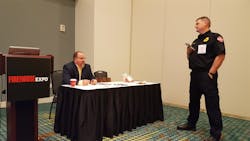FHExpo16: Grants Don't Grow on Trees, But You Can Get Them
NASHVILLE, TN—Using someone else's money when it comes to making fire department purchases is a goal many firefighters have, but it is easier said than done.
“You’re here to figure out how to get someone else’s money,” said Brian Vickers, CEO of Vickers Consulting Services, Inc. He was an instructor at Firehouse Expo in Nashville presenting a class called “Grants Don’t Grow on Trees.” Vickers told the class, “It’s always better to keep your own money.”
Vickers’ presentation was particularly timely with the federal Assistance to Firefighter Grants (AFG) grant program open now through Nov. 18.
A self-professed geek, Vickers is a firefighter and a former software writer from Texas, as well as a long-time writer for Firehouse. Over the years, he has figured out what it takes to write successful grants and has helped firefighters all over the nation secure hundreds of millions of dollars in grants. The key, he said, is to understand your organization and be a passionate advocate for it.
“You have to figure out what you need and find the agency that is willing to fund it,” Vickers said. “If you don’t qualify for a grant from the organization to which you are applying, don’t ask. It won’t work.”
There are, however, many organizations and businesses, including Wal-Mart, ready to help, Vickers said.
“People are willing to help if they know about a need,” he said.
He added there are many private foundations available to help with funding for fire departments as well as government agencies, like Housing and Urban Development (HUD). Vickers said HUD offers block grants to communities with low-income housing and, in many cases, they are automatically awarded and the money can be used to purchase fire trucks and equipment.
“As long as low-income people benefit from the purchase, it’s eligible,” Vickers said.
He also said it’s important to know your organization, its resources and its needs.
“I need a vehicle to get around,” Vickers said. “I want a 1957 Corvette convertible. It doesn’t mean I’ll get one. That’s the difference between wants and needs.”
Vickers also encouraged fire departments to apply for FIRE Act, which are now in their 16th year.
“There are still, to this day, some departments that never have even tried for one,” Vickers said. “We have to erase the perception that because we don’t have enough calls, we can’t be competitive. …To use a Yogi Berra quote, ’90 percent of the game is half mental.’”
When it comes to grant writing, Vickers said 95 percent of the work is research and developing facts and figures. The remaining five percent is actually the writing the grant.
“The amount of effort comes out in the written word,” Vickers said. “If you are going to go for a grant, don’t just pencil whip it; it will show.”
Accuracy is also critically important, Vickers said, noting that typos can interfere with the scoring and make the narratives weaker. He suggests the completed grant application be passed around to others in the department, not only for typos, but inaccuracies and inconsistencies.
“Think about it, if you don’t recognize your department and what it is you’re looking for, how is someone who doesn’t know anything about your department, reading your grant supposed to figure it out,” Vickers said. “You have to be versed in why you are looking for the grant and the purpose of your mission.”
Other tips Vickers offered included advice to not ask for money for problems that don’t exist. “You don’t need to be a farmer to recognize manure,” he said.
Additionally, Vickers said grant narratives need to be solid with facts and not wrought with emotions.
“Writing a grant that’s a tearjerker won’t work,” he said.
Metrics for success also need to be built into the grant-writing process, Vickers said, noting that fire departments have to have a proverbial “measuring stick” upon which department successes or shortcomings must be measured to be competitive.
He said department grant writers need to keep in mind that they will be judged by firefighting peers when it comes to AFG requests and the language should be straight-forward and not too unnecessarily technical or obtuse.
“Be candid and sincere,” Vickers said, adding that the grants must also be authentic. He said departments need to make the applications their own and avoid template grants.
While it might be easy to find grant narratives and copies of successful grants online, Vickers said departments should avoid them because they are easy to detect and the federal government scans applications for large sections of cut-and-paste text.
Vickers also reminded the students most grants have timeframes in which the grant money must be used.
“If your need is as great as you’ve outlined in your application, there’s no reason to wait,” he said. “As soon as you get confirmation that you’ve been awarded a grant, you should be on the phone making an order.”
